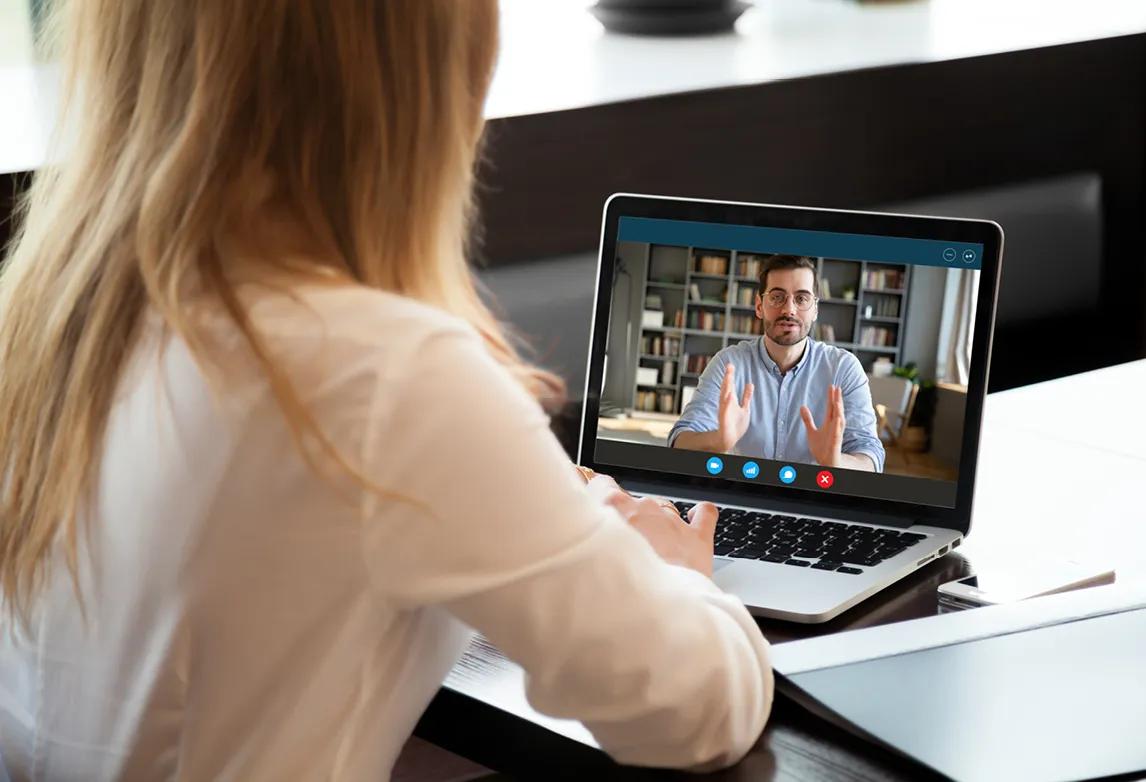Healthcare Interview Tips: Guide to a Successful Virtual Interview

An October 2022 survey found that 70% of Americans prefer to attend a job interview in person.1 Yet, 93% of companies that moved to virtual interviews as a result of the pandemic report that they intend to continue this practice long term.2
Healthcare companies are among those actively holding virtual interviewing sessions, including those with open nursing assistant, hospice aide, and patient care technician positions, just to name a few.3 This makes it important to know how to be successful in a virtual interview if you’re applying for these types of healthcare roles.
What Is a Virtual Interview?
A virtual interview, also sometimes referred to as a remote interview, is a job interview that’s conducted online, usually on a video-based platform. Some companies use Zoom, Microsoft Teams, Google Meet, or a similar type of video conferencing software to hold their online job interviews. Others use virtual interview platforms such as Hireflix, Criteria, and VidCruiter.
Virtual interviews offer employers many benefits. Among them are:4
- Being able to conduct more interviews in one day
- Greater flexibility for hiring managers, especially those who work remotely
- Gaining access to applicants outside the local area
- Enabling more team members to sit in on the interview and assess the candidate
How to Prepare for a Virtual Interview
Virtual or remote interviews are like in-person interviews in that preparation is critical to making a good impression. Therefore, one of the best tips for a virtual interview is to take the time to research the employer. Learn as much as you can about the healthcare organization’s mission, vision, and culture. Check out its website and social media pages to see how it communicates and interacts with others. All of this information can help you determine if you would be a good fit.
If you know someone who works for that healthcare organization, reach out to them. Ask what they think of working at that facility. Inquire about the culture, what they like, what they don’t, and – if they know you well enough – whether they think you’d be happy working there. See if they can offer any advice as you prepare for your remote interview.
Also, look at online employee review sites such as Glassdoor. Read what past and current employees have written about the employer. What were the pros? What about the cons? Look for themes in their answers. This can tell you a lot about the organization’s culture and what you might expect if hired.
Common Virtual Interview Questions
It’s also helpful to prepare for the questions that you may be asked in the virtual interview. Looking at some common questions asked enables you to prepare your answers in advance. This way, you’re not caught off guard and have time to formulate an appropriate (and honest) response.
Here are seven common virtual interview questions, along with a few ideas as to how to answer them:5
- Tell me a little bit about yourself. This interview starter question allows you to share a quick overview of your background, education, and work-related skills and experience. Keep your response brief. If the interviewer wants you to elaborate on a certain topic or area of your past, they’ll ask you about it.
- Why are you thinking about leaving your current job? The purpose of this virtual interview question is to learn more about the factors that have contributed to your desire to find a new healthcare employer or role. When answering, keep a positive tone. Share what you’ve learned in your current position as well as how the open position can help you progress in your healthcare career path.
- What are some of your greatest achievements? This question opens the door for you to not just talk about your professional achievements, but also your strengths and abilities. To maximize your impact, be prepared to discuss your achievements and strengths that can help you succeed in the open healthcare role.
- Why are you a good candidate for this position? With this question, the hiring manager is trying to determine if you hold the skills and qualifications required for the position. This information is typically included in the job post, so review it carefully to see what the healthcare organization is looking for and if you meet those requirements. This is also where researching the company in advance is helpful, giving you the ability to address how you can contribute to its mission and goals.
- Are you good at learning new computer systems? Each healthcare employer uses its own computer system and programs. So, they want to know that you can learn their system quickly if hired for the job.
- Tell me some of your strengths, as well as where you can improve. Sharing your strengths helps tell healthcare organizations where you might excel. Talking about your weaknesses or areas of improvement shows how self-aware you are in addition to highlighting where you might need help.
- Do you have any questions for us? This is generally asked at the end of a virtual interview. Asking your own questions is a great way to convey your interest in the position and the organization as a whole. Virtual interview questions to ask the employer might include those related to day-to-day operations, staffing, or anything else you want to know that hasn’t already been answered during your research or the interview itself. This is also a good time to address any concerns that you may have after reading other employees’ reviews.
Virtual Interview Attire: What to Wear to a Remote Healthcare Interview
Once you know more about the employer and are prepared for some of the questions they may ask, the next step is to decide what to wear for the virtual interview.
It’s often recommended to “dress for the job.” In other words, wear to the interview what you’d wear if you were hired for that role. However, this advice isn’t really transferable to healthcare positions that oftentimes require that you wear scrubs.
The best default is to choose clothing that is both professional and conservative.6 For the top, wear a blouse or a shirt that buttons down. Choose accessories that aren’t distracting, such as by sticking with neutral options like a necklace or earrings.
Even though the interviewer won’t likely see you from the waist down, also wear slacks or a skirt. This can help keep you from being embarrassed if you have to get up to grab something (like your well-written healthcare resume that’s a few steps away).
Dressing professionally from head to toe also helps you feel more confident, which can be a welcome feeling when interviewing for a job!
How to Stand Out in a Virtual Job Interview
Virtual interviews can last anywhere from 15 minutes to over an hour. This doesn’t give you much time to share who you are and what you have to offer that healthcare employer. So, it’s important to help yourself stand out against all of the other applicants that they are interviewing as well.
Tips for a successful virtual interview include:7
- Choose a backdrop that is clean and free from clutter.
- Make sure the interviewer can see you clearly by using a cool light in front of you to illuminate your face.
- Conduct a speed test to ensure that your Internet connection is fast enough to support the virtual interview without dropping off.
- Try the virtual interview platform in advance so you are somewhat familiar with how it works.
- Write out a few notes to reference, but don’t focus on them so intently that you’re not actively involved in the interview.
- When speaking, look at the camera versus staring at your image so you can make good eye contact. (Turning off video mirroring can help with this.)
- If you need a few moments to respond to a virtual interview question, ask for this brief moment, enabling you to stay calm while formulating your response.
- Practice your responses so you’re not talking too fast or too slow when answering the interviewer’s questions.
- Don’t be afraid to use your hands to help add emphasis to certain points that you are excited or passionate about.
What NOT to Do in a Virtual Healthcare Interview
Just as it is important to know how to make a good impression in a virtual interview, it is equally critical to know what to avoid when meeting with a potential employer remotely. According to a review of 513 remote interviews, 80% of candidates who failed to get a job offer had a few things in common:7
- They appeared distracted during the interview.
- They didn’t meaningfully engage the recruiter.
- They came off as if they were reading a script.
Avoiding these same mistakes may help you advance in the hiring process. Plan to interview in a room or space with limited distractions, practice your responses but don’t rehearse them to the point that you sound like a robot, and seek to engage with the interviewer throughout the entire virtual interview.
Sending a Thank You Email After Your Virtual Interview
It’s often said that a little appreciation goes a long way. The same is true when it comes to showing an interviewee some appreciation for taking the time to interview you for the open healthcare position.
Writing a thank you email after a job interview doesn’t have to be a lengthy task either. Simply thank the interviewer for meeting with you, and state how excited you are about being considered for the position.
Sending a thank you after your virtual interview also provides an opportunity to remind them that you look forward to hearing from them regarding the next steps. End the email with a request that they contact you if they want or need any additional information.
UMA Offers Healthcare Education Programs
If you have any questions about how to best prepare for your upcoming virtual interview or would like to talk about your healthcare education options, contact us today. We are happy to help in any way that we can.
In the meantime, feel free to check out these other healthcare interview blogs full of helpful tips for making your time with a prospective employer as successful as it can be:
- A Complete Guide to the Interview Process
- Job Interview Dos and Don’ts
- Dress for Job Interview Success
- American Staffing Association. Vast Majority of Americans Prefer In-Person Job Interviews vs. Virtual. https://americanstaffing.net/posts/2023/02/16/in-person-job-interviews-vs-virtual/
- Maurer R. SHRM. With Virtual Interviews Here to Stay, Best Practices are Needed. https://www.shrm.org/resourcesandtools/hr-topics/talent-acquisition/pages/virtual-video-interviews-best-practices-are-needed.aspx
- Indeed Career Guide. Employers Virtually Interviewing Now. https://www.indeed.com/career-advice/finding-a-job/virtually-interviewing-now
- Indeed for Employers. Virtual vs. In-Person Interviews: Weighing the Pros and Cons. https://www.indeed.com/hire/c/info/virtual-vs-in-person-interviews-pros-cons
- Indeed Career Guide. 7 Online Interview Questions with Sample Answers (Plus Tips). https://in.indeed.com/career-advice/interviewing/online-interview-questions
- Indeed Career Guide. What to Wear for a Zoom Interview (Plus How to Prepare). https://www.indeed.com/career-advice/interviewing/what-to-wear-for-a-zoom-interview
- Laker B, et al. 4 Tips to Nail a Virtual Job Interview. Harvard Business Review. https://hbr.org/2021/03/4-tips-to-nail-a-virtual-job-interview
Request Information
Talk with us. Start your journey.
Complete this form and we'll call you to explore options at UMA and answer your questions. We'll also email you info on how to get started. We're with you at every step!
Request Information
Talk with us. Start your journey.
Complete this form and we'll call you to explore options at UMA and answer your questions. We'll also email you info on how to get started. We're with you at every step!
About the Author
 Christina DeBusk
Christina DeBuskChristina DeBusk is a freelance writer who has been providing health and wellness content to healthcare organizations such as the American Chiropractic Association and International Sports Sciences Association (ISSA) since 2011. She obtained her Bachelor of Science in Sociology from Central Michigan University, minoring in psychology. She has also earned several ISSA certifications, including Certified Personal Trainer and Certified Nutrition Specialist, achieving the status of Elite Trainer.
Related Content


